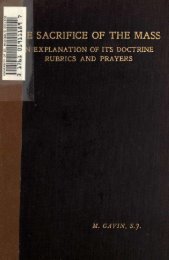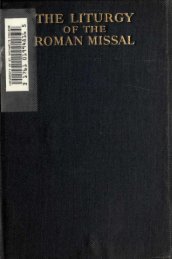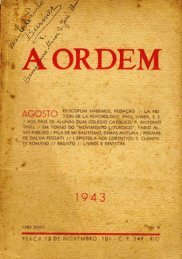E SACRIFICE OF THE MASS
E SACRIFICE OF THE MASS
E SACRIFICE OF THE MASS
Create successful ePaper yourself
Turn your PDF publications into a flip-book with our unique Google optimized e-Paper software.
138 <strong>THE</strong> PRIEST S THANKSGIVING.<br />
EXPLANATION <strong>OF</strong> <strong>THE</strong> PRAYER.<br />
The Body and Blood of Jesus Christ remain in us<br />
so long as the sacramental species are not destroyed.<br />
The Church asks that the sacramental grace may not<br />
pass rapidly as earthly food, but cling to us, filling us<br />
with Jesus Christ, and she prays that no stain or shadow<br />
of sin may remain in the heart that has been refreshed<br />
by the holy sacraments. The plural form sacraments<br />
is supposed by some to indicate the two species of<br />
bread and wine.<br />
of the Church<br />
Sacraments, however, in the language<br />
often mean sacred mysteries. We<br />
do not find sacrament in its technical sense of an<br />
outward sign of an inward grace before the twelfth<br />
century. In various Postcommunions we find the<br />
Eucharist called mysteries, divine sacraments, gifts of<br />
a sacred mystery, heavenly gifts, heavenly nourish<br />
ment, &c.<br />
<strong>THE</strong> PRIESTS THANKSGIVING.<br />
<strong>THE</strong> COMMUNION AND <strong>THE</strong> POST-<br />
COMMUNION.<br />
The antiphon or verse which the priest reads from<br />
the Missal at the Epistle side of the altar after com<br />
municating<br />
is called the Communion. Like the<br />
Offertory before the Oblation of bread and wine, the<br />
Communion is the remnant of a much longer psalm






